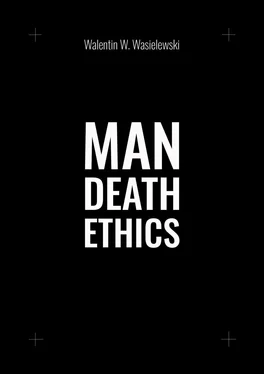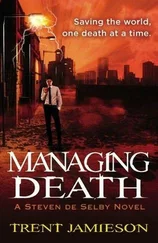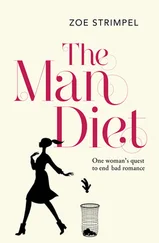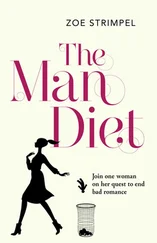Walentin Wasielewski - Man death ethics
Здесь есть возможность читать онлайн «Walentin Wasielewski - Man death ethics» — ознакомительный отрывок электронной книги совершенно бесплатно, а после прочтения отрывка купить полную версию. В некоторых случаях можно слушать аудио, скачать через торрент в формате fb2 и присутствует краткое содержание. ISBN: , Жанр: Прочая научная литература, Философия, Политика, на английском языке. Описание произведения, (предисловие) а так же отзывы посетителей доступны на портале библиотеки ЛибКат.
- Название:Man death ethics
- Автор:
- Жанр:
- Год:неизвестен
- ISBN:9785005615152
- Рейтинг книги:4 / 5. Голосов: 1
-
Избранное:Добавить в избранное
- Отзывы:
-
Ваша оценка:
- 80
- 1
- 2
- 3
- 4
- 5
Man death ethics: краткое содержание, описание и аннотация
Предлагаем к чтению аннотацию, описание, краткое содержание или предисловие (зависит от того, что написал сам автор книги «Man death ethics»). Если вы не нашли необходимую информацию о книге — напишите в комментариях, мы постараемся отыскать её.
Man death ethics — читать онлайн ознакомительный отрывок
Ниже представлен текст книги, разбитый по страницам. Система сохранения места последней прочитанной страницы, позволяет с удобством читать онлайн бесплатно книгу «Man death ethics», без необходимости каждый раз заново искать на чём Вы остановились. Поставьте закладку, и сможете в любой момент перейти на страницу, на которой закончили чтение.
Интервал:
Закладка:
It is interesting to see in Aristotle about the specifics of natural reactions, « …nature seems above all to avoid the painful and to aim at the pleasant…» – so it is said about the biological dichotomy, which directs the actions of animals in the form of instincts and behavioral programs. In the absence of reason, pain and pleasure are what guides the actions of animals. Therefore, it is correct to say, and Aristotle said it – nature does not overcome the problem, but rather avoids the problem. Pain is negative, and pleasure is positive. But neither pain nor pleasure pose a task. Therefore, of course, pain and pleasure are in no way a method of solving problems. So, Aristotle found only a natural analogue of morality, and this is absolutely accurate. If human has a moral dichotomy of good and evil, then nature has a biological dichotomy of pleasure and pain. The specificity and effectiveness of human is that the dichotomy of morality, unlike the dichotomy of natural selection, sees the result of all obstacles and all problems for life – it is death. Nature does not see obstacles but rather uses them to select only those options that avoid the obstacle without touching it. It is possible to draw a parallel with the effect of systematic survivor error, when only correct answers are saved. It turns out that the experience of contact with the frame of death does not physically exist in nature because this experience is dying. For this reason, living nature does not and cannot have any abstract or physical knowledge about death, therefore, there is no relation to it.
We can easily find examples of the difference in approaches to the problem in humans and animals. A man can endure the real pain of treating the disease only because he knows about the death that the disease will bring. The ethical method of relation towards death allows a person to neglect the negativity of pain, preferring the category of good because it leads to overcoming death, and not because it is physically pleasant or lead to happiness and pleasure. Similar to how a human can directly refuse any number of pleasures, labeling their consequences as evil by an ethical method if they lead to death, for instance: drugs, extremes, and imbalances (lack of a golden mean according to Aristotle). The animal will not tolerate pain, since this is one of the levers of instinct, and will avoid treatment at all means if he has such an opportunity. And all this is only because the animal does not know about the disease, or even about death in general. Just as an animal will enjoy as much as possible – even if it is just an electrode sewn into a specific area of the brain, and not a real pleasure. 1 1 Olds J., Milner P. Positive Reinforcement Produced by Electrical Stimulation of Septal Area and Other Regions of Rat Brain (1954)
Such examples can be cited as a tactical solution to the problem of death.
«Professional soldiers turn cowards, however, when the danger puts too great a strain on them and they are inferior in numbers and equipment; for they are the first to fly, while citizen-forces die at their posts, as in fact happened at the temple of Hermes. For to the latter flight is disgraceful and death is preferable to safety on those terms; while the former from the very beginning faced the danger on the assumption that they were stronger, and when they know the facts they fly, fearing death more than disgrace…» – here we discuss the moment when individuals give their lives for the sake of the life of their society. In this case, it is clear whythe mercenaries are fleeing: they are not connected with the protected society, and for them their own death is more terrible than the death of some foreign society or state. Contrary to the civil militia that is connected with the protected society. They have their material and spiritual values, their children, parents and relatives, that is, everything that is part of themselves, and will exist much longer than them in the historical perspective. Thus, the phenomenon of History and Culture can be cited as an attempt to overcome death strategically.
One of the types of culture is Ritual and Religion, which gives us another example of a strategic, but imaginary, overcoming of the problem of death in the form of postulating life after death..
«But we must not follow those who advise us, being men, to think of human things, and, being mortal, of mortal things, but must, so far as we can, make ourselves immortal, and strain every nerve to live in accordance with the best thing in us; for even if it be small in bulk, much more does it in power and worth surpass everything.» – this thought of Aristotle fits perfectly into the context of our hypothesis. If Aristotle speaks of overcoming death as a problem purely hypothetically, then with the development of science this goal can be quite specific and unambiguous for any activity that together make up the same general idea, « Are goods one, then, by being derived from one good or by all contributing to one good …» Yes, that’s the whole point. The only source is the understanding of death, and not only good, but also evil, and they both serve the idea of overcoming the problem.
It is necessary to clarify that it is the understanding of the problem that leads to the solution of the problem. If this is the case, then all the benefits and all the harms listed in the treatise Ethics, are reduced to solving the most common problem – death. This is partly revealed to us in reality. Today, in developed countries, the average life expectancy is at least twice the biological and anthropological norms, and that is a lot.
Conclusion: everything that a human does in all its diversity (individually, in society, and in humanity) to overcome death is good, blessing, and virtue. Everything that leads an individual, society, and humanity to death or decay is evil, harm, and vice.
At first glance, this essence of ethics seems too simple. It’s too obvious to be anything more than what we already see around us. But in fact, the opposite is true: yes, the principle is simple, but the tangle of interconnections, and the whole abyss of problems of the physical world around us, the social world is not at all obvious until now, and the manifestations of good and evil must be constantly identified by an ethical method.
In the process of cognition in nature and society, the more interrelations we identify, the more difficult it is for us to establish unambiguously which action and in what ratio with other actions will lead Humanity to the prosperity of life, and which ultimately, as a result of multiple interactions, will destroy it. And, nevertheless, the advantages of such a principle are also obvious. We have the most constructive system for assessing and predicting the path that humanity is following. Let the decisions made be hypothetical, but the criterion with which the result can be compared is clear. This is how morality works as an experience of evaluating the results of previous decisions.
It is necessary to make one more important point: the locality of development as opposed to global development. Historically, societies have developed locally, which gave rise to the well-known phenomenon of different good and evil. Friedrich Engels noted, « Ideas about good and evil changed so much from people to people, from century to century, that they often directly contradicted one another.» It was the locality of development that generated contradictions between societies and different interpretations of morality, since divided societies are situationally perceived as threats, therefore, problems for each other.
If the idea of overcoming death being implemented on a global level, when one part of humanity does not threaten to destroy another part of it precisely because both these parts equally need all possible development options, then the idea of overcoming death may well become a global Idea of Human Development.
Читать дальшеИнтервал:
Закладка:
Похожие книги на «Man death ethics»
Представляем Вашему вниманию похожие книги на «Man death ethics» списком для выбора. Мы отобрали схожую по названию и смыслу литературу в надежде предоставить читателям больше вариантов отыскать новые, интересные, ещё непрочитанные произведения.
Обсуждение, отзывы о книге «Man death ethics» и просто собственные мнения читателей. Оставьте ваши комментарии, напишите, что Вы думаете о произведении, его смысле или главных героях. Укажите что конкретно понравилось, а что нет, и почему Вы так считаете.






![Микки Спиллейн - Death of the Too-Cute Prostitute [= Man Alone]](/books/437201/mikki-spillejn-death-of-the-too-thumb.webp)





